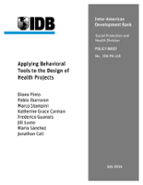Applying Behavioral Tools to the Design of Health Projects
Date
Jul 2014
This technical note discusses how behavioral economics insights can be used to enhance the design of health interventions, with emphasis on those addressing non-communicable diseases, by promoting behavioral changes. These interventions are neither sophisticated nor costly, and are particularly suited for cases in which individuals are seemingly not making rational choices about their health. The main contribution of this note is the attempt to orient non-expert practitioners in the analysis of the problem and design of the intervention. For this purpose, we provide a novel framework to map common behavioral biases and barriers that have limited the success of traditional interventions (i.e., bounded rationality, bounded willpower, and bounded selfishness) to the most promising solutions identified in the existing literature (e.g., framing, commitment contracts, and social incentives).



